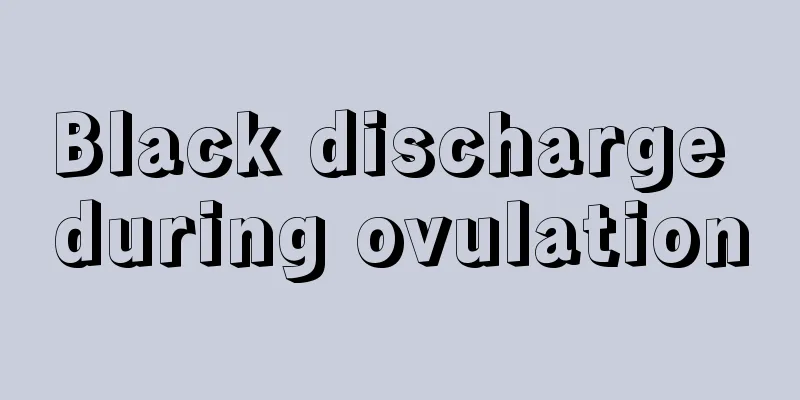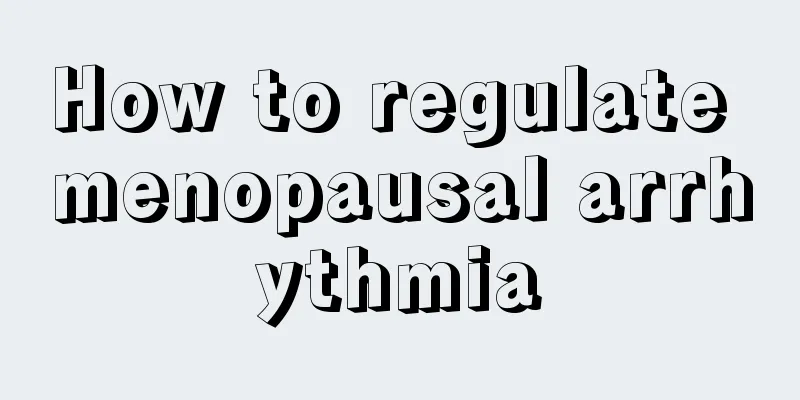Black discharge during ovulation

|
There will be some vaginal discharge during the ovulation period, which is what we call leucorrhea, and leucorrhea is generally white. If you have black discharge during the ovulation period, it may be caused by bleeding accompanied by leucorrhea. You don’t need to worry too much about this. If there is still black discharge after the ovulation period, you need to pay attention to it. At this time, it may be due to abnormal leucorrhea caused by inflammation. Normally, leucorrhea during ovulation should be colorless, transparent or milky white, but many women find that they have brown discharge during ovulation. What is going on? 1. Generally speaking, brown discharge in leucorrhea during ovulation may be caused by ovulation bleeding. Brown discharge in leucorrhea during ovulation may also be due to a decrease in estrogen levels in the body. The endometrium may fall off due to the decrease in hormone levels, resulting in bleeding. If the amount of bleeding is not large and the duration is short, it will generally stop on its own within 2-3 days. There is no need to worry as it is a normal phenomenon. 2. If the brown discharge in the leucorrhea during ovulation does not disappear after 2-3 days, it may be caused by some gynecological diseases. For example, uterine fibroids and endometriosis can cause brown discharge. 3. Mental stress can also cause brown discharge during ovulation. Excessive mental stress or mental depression can have a great impact on changes in women's menstrual period. Therefore, in daily life, female friends should try their best to adjust their mentality. The benefits of maintaining a good mood to the body are self-evident. 4. Continuously taking certain medications for a period of time can also cause brown discharge in the leucorrhea during ovulation. Drugs can cause endocrine disorders, menstrual disorders, etc. What are the symptoms of ovulation? When does ovulation occur? Does it indicate anything to our body? Many people are confused about ovulation. Let's take a look at the symptoms when ovulation occurs. 1. Anal swelling When you feel a slight falling sensation in your anus and a slight pain in your lower abdomen, it may mean that you are currently in your ovulation period, because the mature eggs are being discharged from the ovaries at this time, which will cause this kind of reaction. 2. Increased vaginal discharge During ovulation, you will clearly feel that your secretions are more than usual and become thinner, mostly in the shape of egg white. This significant increase in secretions usually lasts about 2 days. And this is the peak period of your ovulation. 3. Breast tenderness During ovulation, many women experience nipple tingling and breast tenderness. In severe cases, your nipples may be extremely painful when touched, and sometimes the breast pain may even continue until your next menstrual period. |
<<: Nipple pain after ovulation
>>: Can a woman have sex after giving birth for one month?
Recommend
What are the symptoms of moderate cervical erosion?
Have you ever heard of cervical erosion? In fact,...
What should I do if my breasts swell after induced labor?
Breast engorgement will also occur after induced ...
The best sleep schedule for girls
Girls should pay more attention to sleep than boy...
What to do if you have frequent urination during pregnancy
Having a baby is a very happy thing for the whole...
40 weeks of pregnancy, sudden increase in discharge
If a pregnant woman experiences increased secreti...
National Restaurant Association: Top culinary predictions for 2024
The whole world is a menu Social media is turning...
Can I take ibuprofen while breastfeeding?
Ibuprofen is an over-the-counter antipyretic and ...
Which department should I go to for infertility?
The organization of hospital outpatient clinics g...
What are the advantages and disadvantages of tampons?
We have all heard that during menstruation, you c...
Why does it hurt under my right breast?
Breast health is very important for women, becaus...
How is the uterine septum formed?
The uterine septum is also called the septate ute...
What to do if you are bitten by a dog? Beijing CDC reminds you: Early wound treatment is very important
People's Daily Online, Beijing, September 9 (...
Is it safe to just return to the rental house during the epidemic? What should I do if I am not allowed to enter the rental house during the epidemic?
During the epidemic, many places have resumed wor...
Phlegm in the throat during late pregnancy
Phlegm is a special substance attached to the ins...









